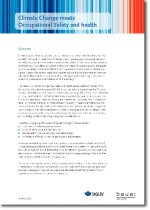Climate Change meets Occupational Safety and Health
Climate change and its various effects are a challenge for the international community. This also affects the world of work. Climate change leads to growing exposure to heat and solar UV radiation, especially when working outdoors. The number of non-native insects and other vectors transmitting infectious diseases is likely to increase. The same applies to the appearance of new allergens and toxins. This and efforts towards decarbonization result into new risks and hazards for workers requiring adequate means and protective measures to ensure safe and healthy work. It is obvious that climate change is a global challenge and therefore requires a joint international collaboration and networking.
The Federal Institute for Occupational Safety and Health (BAuA) and the Institutes of the German Social Accident Insurance (DGUV) invited international experts from the G7 countries to a networking event on October 17 in Dresden, Germany. The German Federal Ministry of Labour and Social Affairs (BMAS) initiated and supported this event in the context of the German G7 presidency in the Employment Track. More than 100 experts from G7 countries, the EU and further interested countries attended the event. The participants discussed various mechanisms through which climate change will affect our working life, including heat, solar UV-exposure, extreme weather events, spread of emerging diseases and allergies, new hazardous substances, challenges in alternative energy production and a circular economy, and psychological effects of climate change on the world of work.
Bibliographic information
Title: Climate Change meets Occupational Safety and Health.
Deutsche Gesetzliche Unfallversicherung / Bundesanstalt für Arbeitsschutz und Arbeitsmedizin, 2022. pages: 11, PDF file, DOI: 10.21934/cooperation20221219
